unit 2 witnessing time word power
文档属性
| 名称 | unit 2 witnessing time word power |
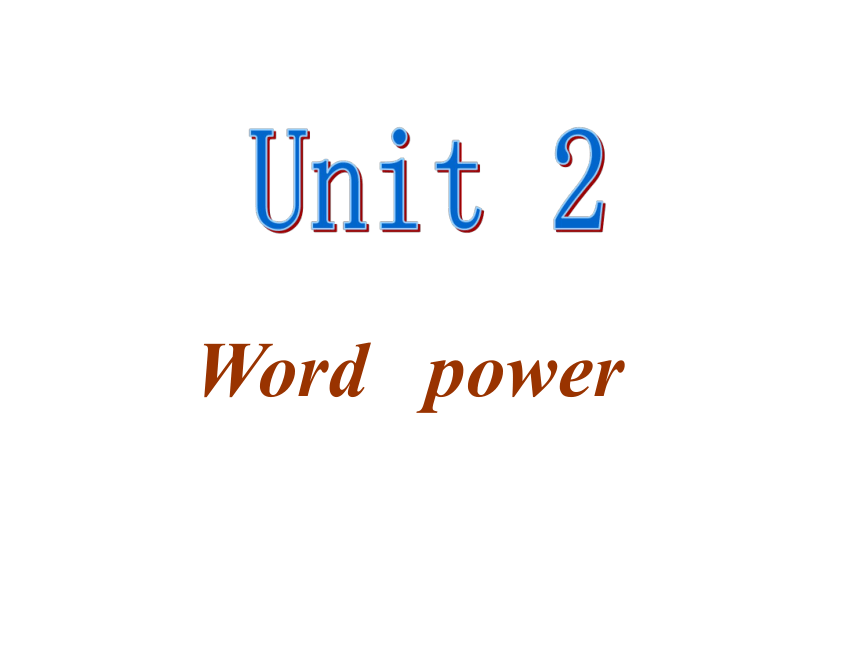
|
|
| 格式 | rar | ||
| 文件大小 | 310.1KB | ||
| 资源类型 | 教案 | ||
| 版本资源 | 牛津译林版 | ||
| 科目 | 英语 | ||
| 更新时间 | 2010-09-26 00:00:00 | ||
图片预览

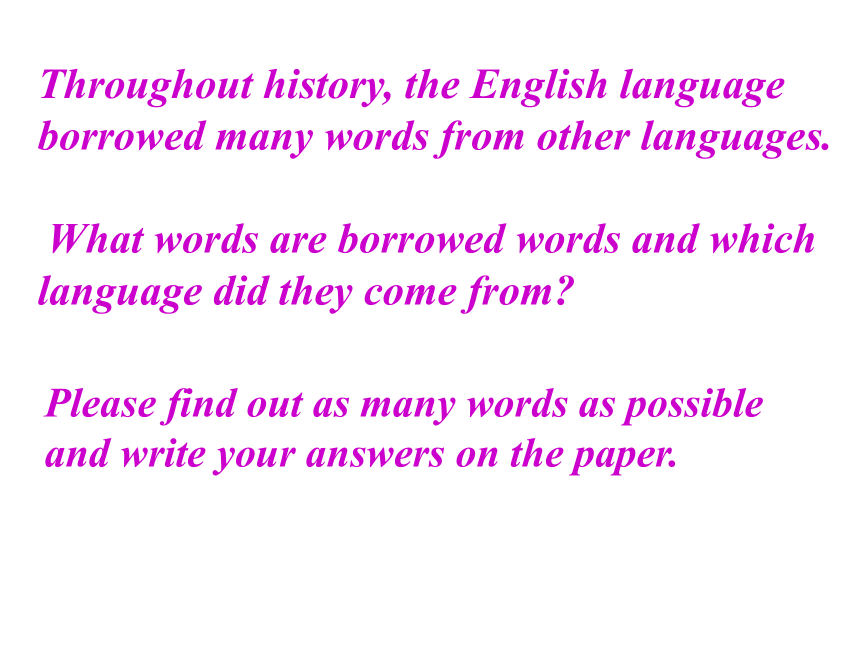
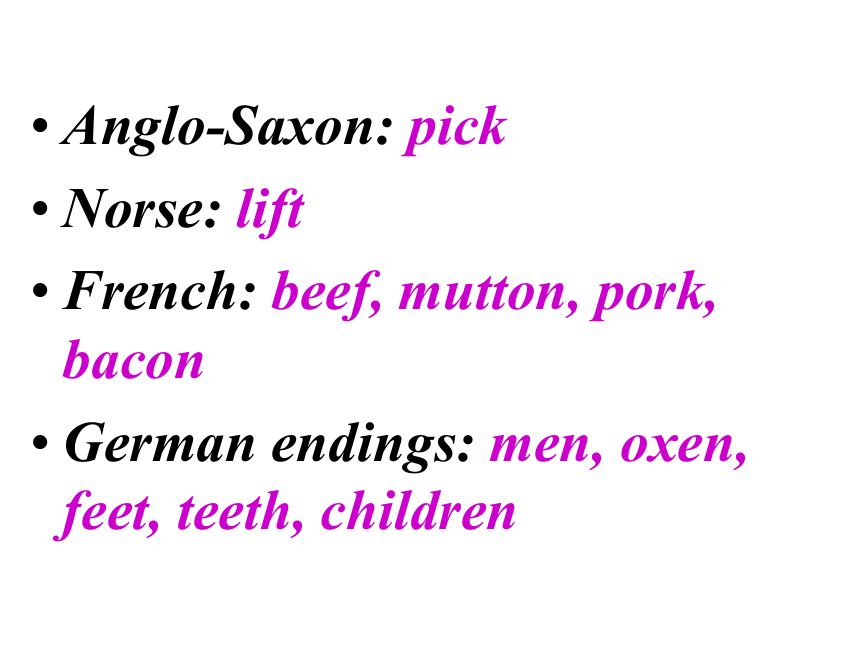


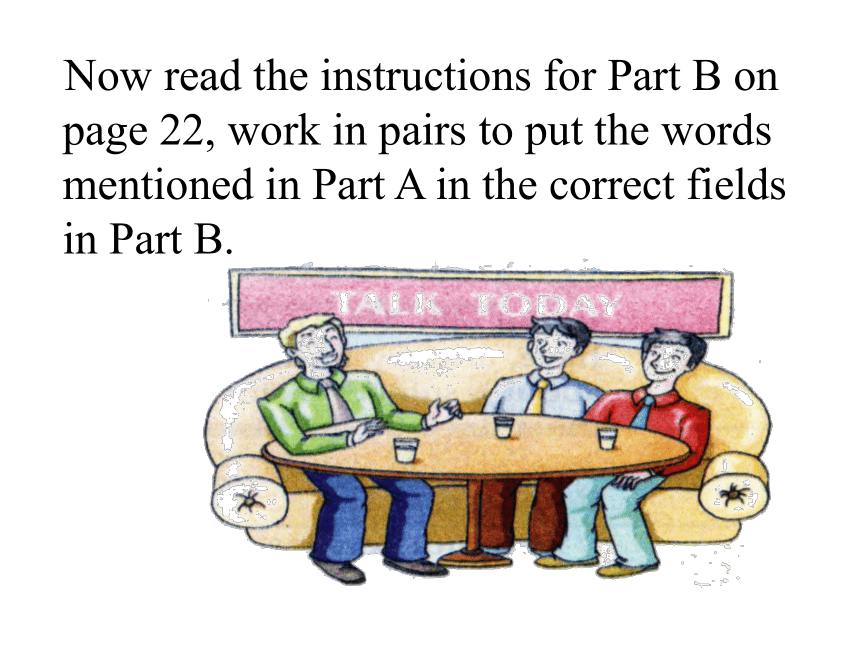
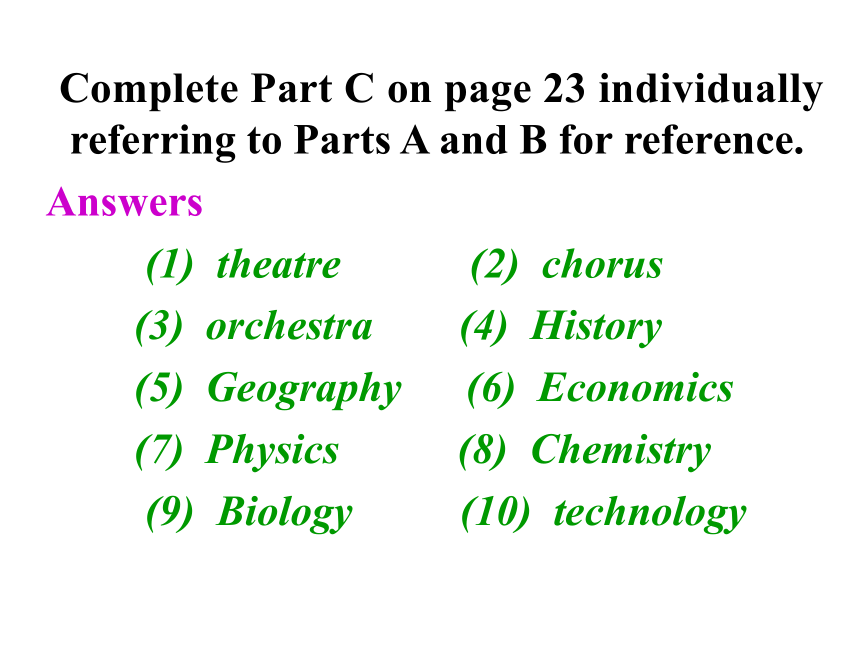
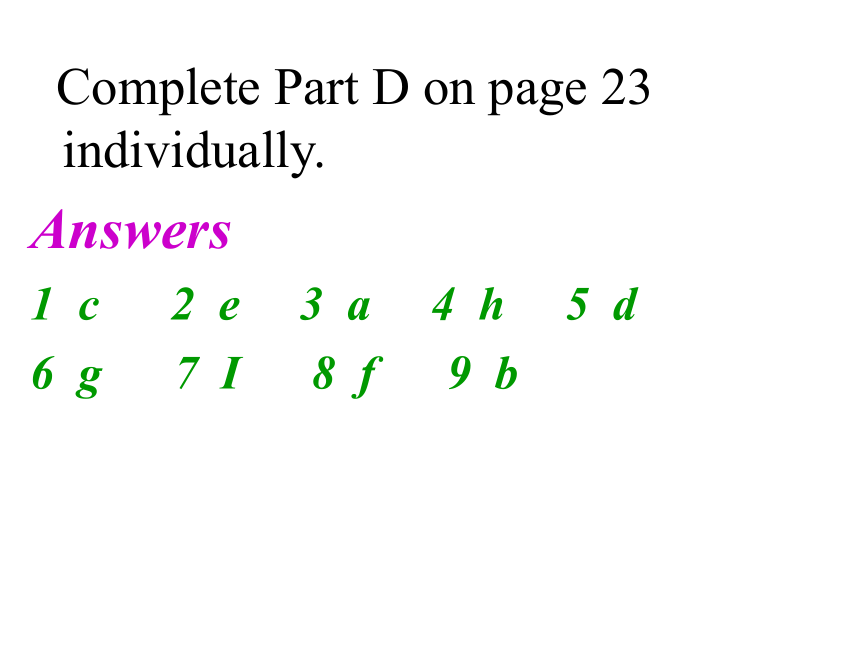

文档简介
课件23张PPT。Word powerUnit 2Throughout history, the English language borrowed many words from other languages.
What words are borrowed words and which language did they come from? Please find out as many words as possible and write your answers on the paper.Anglo-Saxon: pick
Norse: lift
French: beef, mutton, pork, bacon
German endings: men, oxen, feet, teeth, children Pair work: Apart from the above languages, the English language also borrowed many words from Greek. Work in pairs and do some research on the Greek in English and present some Greek words in class.Now read the passage in Part A and find out the answers to the following questions:
1. What words does Greek contribute to the English language?
( Words related to science, sport and many everyday words.)
2. Why are there so many scientific words that come from Greek?
( Because the Greeks made a huge contribution to the field of science.) Now read the instructions for Part B on page 22, work in pairs to put the words mentioned in Part A in the correct fields in Part B.
Complete Part C on page 23 individually referring to Parts A and B for reference.
Answers
(1) theatre (2) chorus
(3) orchestra (4) History
(5) Geography (6) Economics
(7) Physics (8) Chemistry
(9) Biology (10) technology Complete Part D on page 23 individually.
Answers
1 c 2 e 3 a 4 h 5 d
6 g 7 I 8 f 9 b Language points1. borrow… from… (P22)
borrow (RECEIVE) ? v.(从······)借入,借用
1 [T] to get or receive something from someone with
the intention of giving it back after a period of time:
Could I borrow your bike from (NOT STANDARD off) you until next week?
She used to borrow money and not bother to pay it back.
He borrowed a novel from the library.
2 [T] to take and use a word or idea from another language or piece of work:
(由······)采用(说词,思想),采取
English has borrowed many words from French. 2. find ourselves using Greek…(P22)
find (DISCOVER) ? v. [T] found, found
1 to discover, especially where a thing or person is, either
unexpectedly or by searching, or to discover where to obtain or how to achieve something: 发现······, 遇见
I've just found a ten-pound note in my pocket.
[+ two objects] Has he found himself a place to live yet?
[+ object + adjective] She was found unconscious and bleeding.
[+ that] The study found that men who were married lived longer than those who were not.
Do you think they'll ever find a way of bringing peace to the region?2 to think or feel a particular way about someone or something: 发现······(为······)
[+ object + noun or adjective] Do you find Clive difficult to talk to?
I don't find him an easy person to get on with.
She doesn't find it easy to talk about her problems.
[+ ing form of verb] I find living in the city quite stressful.
3 to become aware that something exists or has happened:
[+ (that)] We came home to find (that) the cat had had kittens.
I found (that) I could easily swim a mile.1.(2006广东)
So difficult ______ it to work out the problem that I decided to ask Tom for advice. ?A. I did find?????? B. did I find?????
C. I have found????? D. have I found高考链接 2. (2004江苏)
The man insisted________ a taxi for me even though I told him I lived nearby.
A. find??????????? B. to find???????
C. on finding D. in finding 3. (2005重庆)
— What should I do with this passage ? — ____________the main idea of each paragraph. ?A.Finding out?? B.Found out???????
C.Find out????? D.To find out4. (2005广东)
He hurried to the station only ________that the train had left.
A. to find?? B. finding???
C. found?? D. to have found
5. My dictionary______ . I have looked for it everywhere but still ___it.
A. has lost; don't find??
B. is missing; don't find
C. has lost; haven't found????
D. is missing; haven't found 6. (2006北京)
--- _______ leave at the end of this month.
--- I don’t think you should do that until ________ another job. ?? A. I’m going to; you’d found??
B. I’m going to; you’ve found ?? C. I’ll; you’ll find???????
D. I’ll; you’d find owe… to( page 22)
owe (HAVE DEBTS) ??v. [T]
to need to pay or give something to someone
because they have lent money to you, or in
exchange for something they have done for you:
欠(钱),借钱, 负债
[+ two objects] I owe Janet ten pounds.
We still owe $1000 on our car (= We still need to pay $1000 before we own our car).
I owe you a drink for helping me move.
I think you owe (= should give) me an explanation/apology. owe (AS A RESULT) ?? v. [T]
to have success, happiness, a job, etc. only
because of what someone has given you or
done for you or because of your own efforts
(因······事, 有某人)受到恩惠
I owe my success to my education.
He owes his life to the staff at the hospital.
I owe everything (= I am very grateful) to my parents. owing to prep. 因为,由于······
because of:
The concert has been cancelled owing to lack of support.
I owe you (one) INFORMAL
used as a way to thank someone for helping you
and showing that you will do something for them in the future:
Thanks for the help, Bill - I owe you one. 4. a great deal( page 22)
a good/great deal of 大量,许多 much: The new law met with a good deal of opposition at local level.
apart from( page 22)
apart (SEPARATE) ? adv. 1 separated by a distance or, less commonly, by time: 与······分开地, 相隔 Stand with your feet wide apart. How far apart should the speakers be? We were asked to stand in two lines three metres apart. 2 into smaller pieces: 拆散地 My jacket is so old it‘s falling apart. I took the motor apart (= separated it into pieces) to see how it worked. apart ?adj. [after verb] living or staying in a different place from the person that you are married to or have a close relationship with: When you're apart you rely so heavily on the phone.apart from except for or not
considering:
He works until nine o'clock every evening, and that's quite apart from the work he does over the weekend.
Apart from the salary/Salary apart, it's not a bad job.
Apart from you and me/You and me apart, I don't think there was anyone there under thirty.Bye - bye!
What words are borrowed words and which language did they come from? Please find out as many words as possible and write your answers on the paper.Anglo-Saxon: pick
Norse: lift
French: beef, mutton, pork, bacon
German endings: men, oxen, feet, teeth, children Pair work: Apart from the above languages, the English language also borrowed many words from Greek. Work in pairs and do some research on the Greek in English and present some Greek words in class.Now read the passage in Part A and find out the answers to the following questions:
1. What words does Greek contribute to the English language?
( Words related to science, sport and many everyday words.)
2. Why are there so many scientific words that come from Greek?
( Because the Greeks made a huge contribution to the field of science.) Now read the instructions for Part B on page 22, work in pairs to put the words mentioned in Part A in the correct fields in Part B.
Complete Part C on page 23 individually referring to Parts A and B for reference.
Answers
(1) theatre (2) chorus
(3) orchestra (4) History
(5) Geography (6) Economics
(7) Physics (8) Chemistry
(9) Biology (10) technology Complete Part D on page 23 individually.
Answers
1 c 2 e 3 a 4 h 5 d
6 g 7 I 8 f 9 b Language points1. borrow… from… (P22)
borrow (RECEIVE) ? v.(从······)借入,借用
1 [T] to get or receive something from someone with
the intention of giving it back after a period of time:
Could I borrow your bike from (NOT STANDARD off) you until next week?
She used to borrow money and not bother to pay it back.
He borrowed a novel from the library.
2 [T] to take and use a word or idea from another language or piece of work:
(由······)采用(说词,思想),采取
English has borrowed many words from French. 2. find ourselves using Greek…(P22)
find (DISCOVER) ? v. [T] found, found
1 to discover, especially where a thing or person is, either
unexpectedly or by searching, or to discover where to obtain or how to achieve something: 发现······, 遇见
I've just found a ten-pound note in my pocket.
[+ two objects] Has he found himself a place to live yet?
[+ object + adjective] She was found unconscious and bleeding.
[+ that] The study found that men who were married lived longer than those who were not.
Do you think they'll ever find a way of bringing peace to the region?2 to think or feel a particular way about someone or something: 发现······(为······)
[+ object + noun or adjective] Do you find Clive difficult to talk to?
I don't find him an easy person to get on with.
She doesn't find it easy to talk about her problems.
[+ ing form of verb] I find living in the city quite stressful.
3 to become aware that something exists or has happened:
[+ (that)] We came home to find (that) the cat had had kittens.
I found (that) I could easily swim a mile.1.(2006广东)
So difficult ______ it to work out the problem that I decided to ask Tom for advice. ?A. I did find?????? B. did I find?????
C. I have found????? D. have I found高考链接 2. (2004江苏)
The man insisted________ a taxi for me even though I told him I lived nearby.
A. find??????????? B. to find???????
C. on finding D. in finding 3. (2005重庆)
— What should I do with this passage ? — ____________the main idea of each paragraph. ?A.Finding out?? B.Found out???????
C.Find out????? D.To find out4. (2005广东)
He hurried to the station only ________that the train had left.
A. to find?? B. finding???
C. found?? D. to have found
5. My dictionary______ . I have looked for it everywhere but still ___it.
A. has lost; don't find??
B. is missing; don't find
C. has lost; haven't found????
D. is missing; haven't found 6. (2006北京)
--- _______ leave at the end of this month.
--- I don’t think you should do that until ________ another job. ?? A. I’m going to; you’d found??
B. I’m going to; you’ve found ?? C. I’ll; you’ll find???????
D. I’ll; you’d find owe… to( page 22)
owe (HAVE DEBTS) ??v. [T]
to need to pay or give something to someone
because they have lent money to you, or in
exchange for something they have done for you:
欠(钱),借钱, 负债
[+ two objects] I owe Janet ten pounds.
We still owe $1000 on our car (= We still need to pay $1000 before we own our car).
I owe you a drink for helping me move.
I think you owe (= should give) me an explanation/apology. owe (AS A RESULT) ?? v. [T]
to have success, happiness, a job, etc. only
because of what someone has given you or
done for you or because of your own efforts
(因······事, 有某人)受到恩惠
I owe my success to my education.
He owes his life to the staff at the hospital.
I owe everything (= I am very grateful) to my parents. owing to prep. 因为,由于······
because of:
The concert has been cancelled owing to lack of support.
I owe you (one) INFORMAL
used as a way to thank someone for helping you
and showing that you will do something for them in the future:
Thanks for the help, Bill - I owe you one. 4. a great deal( page 22)
a good/great deal of 大量,许多 much: The new law met with a good deal of opposition at local level.
apart from( page 22)
apart (SEPARATE) ? adv. 1 separated by a distance or, less commonly, by time: 与······分开地, 相隔 Stand with your feet wide apart. How far apart should the speakers be? We were asked to stand in two lines three metres apart. 2 into smaller pieces: 拆散地 My jacket is so old it‘s falling apart. I took the motor apart (= separated it into pieces) to see how it worked. apart ?adj. [after verb] living or staying in a different place from the person that you are married to or have a close relationship with: When you're apart you rely so heavily on the phone.apart from except for or not
considering:
He works until nine o'clock every evening, and that's quite apart from the work he does over the weekend.
Apart from the salary/Salary apart, it's not a bad job.
Apart from you and me/You and me apart, I don't think there was anyone there under thirty.Bye - bye!
同课章节目录
- 模块9
- Unit 1 Other countries, other cultures
- Unit 2 Witnessing time
- Unit 3 The meaning of colou
- Unit 4 Behind beliefs
- 模块10
- unit 1 building the future
- unit 2 people on the move
- unit 3 protecting ourselves
- unit 4 law and orde
- 模块11
- unit 1 careers and skills
- unit 2 getting a job
- unit 3 the secret of success
- unit 4 the next step
